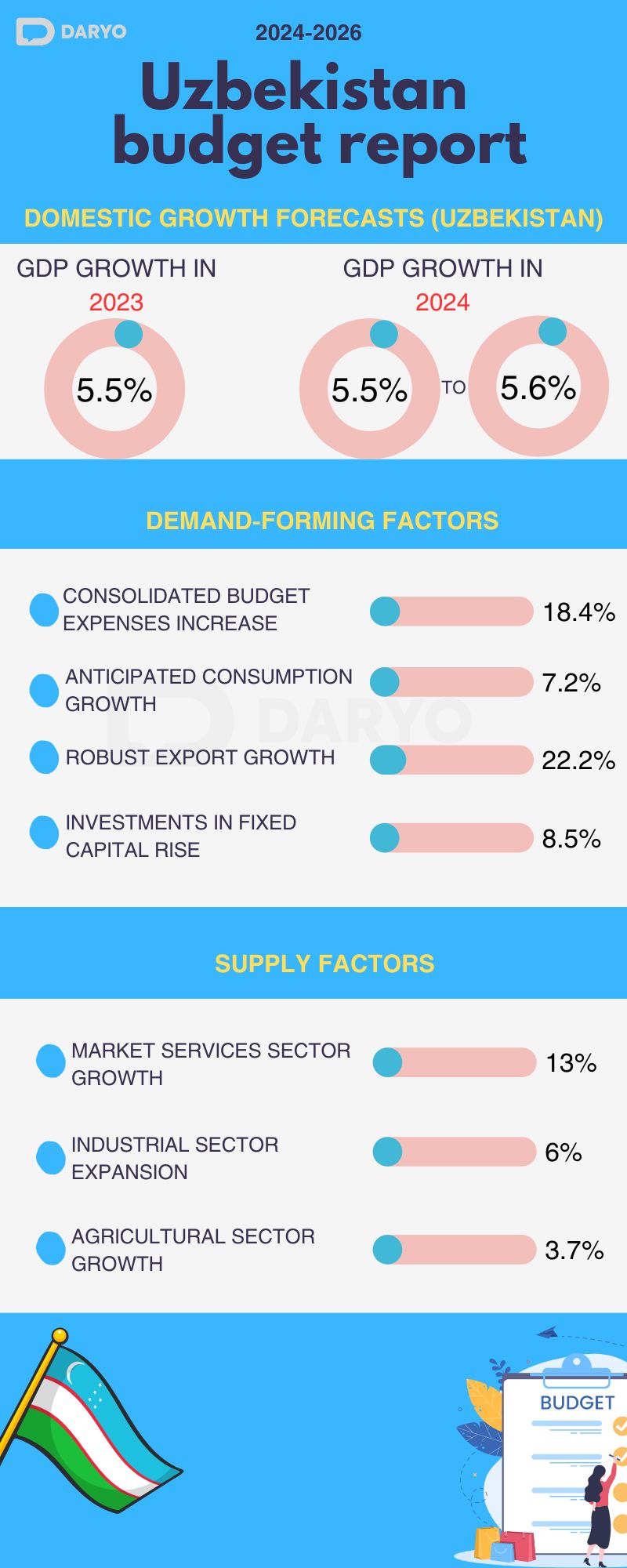As we approach the end of 2023, Uzbekistan finds itself in a dynamic economic landscape shaped by both global and domestic factors. The recently released BUDGET 2024-2026 report from the Ministry of Economy and Finance of Uzbekistan provides valuable insights into the anticipated economic performance, projecting a slowdown in global economic growth.

Global Economic Slowdown
Ministry of Economy and Finance's report shows that the world economy is expected to experience a slight deceleration, with growth slowing from 3.0% in 2023 to 2.9% in 2024. Developed countries are also anticipated to witness a marginal decline from 1.5% to 1.4% during the same period. This global economic shift is attributed to the continuation of strict monetary policies worldwide, grappling with the challenges posed by high global inflation and the implementation of fiscal consolidation measures in various countries to alleviate the burden of public debt.
Trade Partner Dynamics
Uzbekistan's economic fortunes are intricately linked to its major trade partners. The report highlights changes in the economic growth rates of key partners, such as Russia, China, Turkey, and Kazakhstan. Notably, the growth rates for these nations are expected to moderate in 2024 compared to the preceding year, signaling potential challenges and opportunities for Uzbekistan's trade relationships.
Domestic Growth Forecasts
International financial organizations, including the IMF, World Bank, and Asian Development Bank, have provided growth forecasts for Uzbekistan. The consensus is that Uzbekistan's GDP growth in 2023 is estimated at around 5.5%, with projections ranging from 5.5 to 5.6% for 2024.
Key Sectors Driving Growth
The report sheds light on the internal factors fueling Uzbekistan's economic growth. The country's economic strategy, including reforms aimed at liberalization, industrial development, and regional growth initiatives, plays a pivotal role. The two main factors contributing to economic growth are identified as demand-forming factors and supply factors.
a) Demand-Forming Factors:
- Consolidated budget expenses are expected to increase by 18.4%, stimulating economic growth.
- Anticipated growth in consumption by 7.2%, driven by an increase in general population income and remittances.
- Robust growth in exports by 22.2%, supporting overall economic activity.
- Investments in fixed capital expected to rise by 8.5%, driven by foreign direct investments and loans from various sources.
b) Supply Factors:
- Market services sector expected to grow by 13%, with notable contributions from communication, information, education, finance, trade, and transport services.
- Industrial sector forecasted to expand by 5.5-6%, with significant contributions from key areas like oil products, clothing, automotive, construction goods, textile products, and furniture production.
- Agricultural sector poised to grow by 3.7%, driven by increases in grain production, fruit, sugarcane, and grapes.
Infrastructure and Energy Initiatives
To ensure sustainable economic growth, Uzbekistan is investing in infrastructure and energy projects. The launch of major projects, such as the Uzbekistan GTL, the expansion of hydrometallurgical plants, and increased production in sectors like cement, contributes significantly to economic stability.
Earlier Daryo reported that Uzbekistan's Ministry of Economy and Finance has revealed the 2024 budget, providing insights into critical economic indicators and financial forecasts for the approaching year.
Follow Daryo's official Instagram and Twitter pages to keep current on world news.
Comments (0)